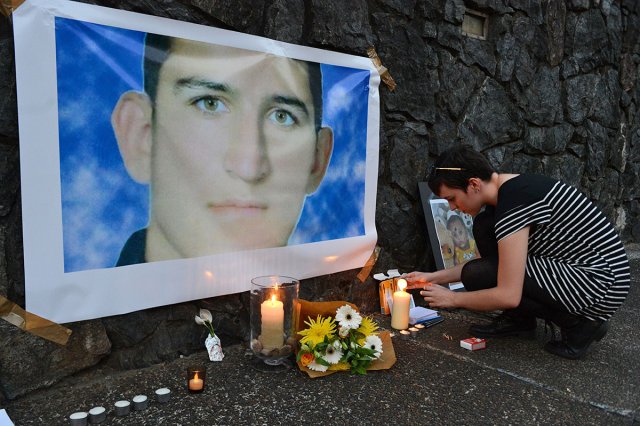
Four years ago thousands of people lit candles in more than 750 locations across Australia to remember slain 23-year-old Iranian asylum seeker Reza Berati and demand an end to Australia’s detention system.
It was the largest post-Howard government mobilisation for refugee rights to date.
At rallies across the country activists who had been in contact with people in Manus Island detention centre exposed the horrors of that night.
His roommate, Benham Satah, recalled that night: “PNG local vigilantes stormed Mike compound and along with guards began attacking us. We were trying to escape the violence: many of us hid in our rooms and were pulled out from under our beds. Some people were slashed with machetes; gunshots were fired; someone even lost an eye.
“I will never forget that night, it was the night I witnessed the brutal murder of my friend and roommate, Reza Barati.
“Reza was in the phone room calling for help and when he came back, locals stopped him at our doorway and beat him to death. He had hoped for a safe life in Australia but was instead murdered by this cruel regime.
“There will never be justice for his death. They cannot bring Reza back to his family.
“After making a police statement, detailing my account of the violence that led to Reza's murder, I was taken to the Chauka compound and tortured.”
Tears were shed at the vigils. But the tears soon turned to outrage.
People wondered how this cruelty could continue. How could the offshore camps remain open when someone had been murdered? How could the safety of the people in them be guaranteed? How could the government ignore such an outpouring of concern and anger from across Australia and the world?
The cold, heartless political expediency of Labor and the Coalition meant they continued to operate.
Four guards were eventually charged: two locals from PNG and two from Australia. Only the locals faced court — the Australian guards were whisked away before they could face justice.
In the days before the trial, the key witness, Benham Satah, faced death threats from guards. Calls to bring him to Australia while the trial proceeded were ignored by the Australian government.
The locals were sentenced to jail, but one of them escaped 11 months ago and has not been found.
The death of Reza Berati could have meant the end of this cruelty — but instead it was just the start.
Since his death, others have been murdered in offshore detention by Australia’s refugee policy. An inquest showed Hamed Khazaei died from deliberate medical neglect later that year.
Last year Hamed Shamshiripour, a 31-year-old Iranian refugee, was found hanging with his body battered and bruised in bushland near the East Lorengau school. He had been regularly beaten by police, locals and guards.
There have been others. People who came to Australia seeking safety have instead had their lives systemically destroyed. Refugees living in the Manus Island community face daily machete attacks by locals.
Satah is still on Manus Island, four years after Berati’s death. He said “I live in fear. Sometimes I feel that I'm going crazy. I don't normally sleep at night. PNG is not safe for me, I cannot stay here.”
In Perth there will be an action to mark the fourth anniversary of Berati’s death on Febuary 17. Around the country refugee activist groups are mobilising for Palm Sunday marches.
There have been too many Reza Berati’s, too many deaths caused by this cruel policy. Let’s end the torture and bring them here.
Like the article? Subscribe to Green Left now! You can also like us on Facebook and follow us on Twitter.